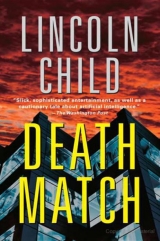
Текст книги "Death Match"
Автор книги: Lincoln Child
Соавторы: Lincoln Child
Жанр:
Триллеры
сообщить о нарушении
Текущая страница: 2 (всего у книги 26 страниц)
THREE
The chairman of Eden Incorporated rose from his seat. He smiled, and his face broke into kindly, almost grandfatherly lines. “Dr. Lash. Thank you so much for coming. Please, take a seat.” And he motioned toward the long table.
Lash took a seat across from Lelyveld.
“Did you drive in from Connecticut?”
“Yes.”
“How was the traffic?”
“I was parked on the Cross Bronx about half an hour. Otherwise, okay.”
The chairman shook his head. “That road is a disgrace. I have a weekend place not far from you myself, in Rowayton. These days I usually take a helicopter. One of the perks.” He chuckled, then opened a leather portfolio that lay beside him. “Just a few formalities before we get started.” He took out a sheaf of stapled pages and passed it across the desk. It was followed by a gold pen. “Would you mind signing this, please?”
Lash looked at the top page. It was a nondisclosure agreement. He flipped quickly through the pages, found the signature line, signed.
“And this.”
Lash took the second proffered document. It appeared to be some kind of guarantee of confidentiality. He turned to the back page, signed.
“And this, if you please.”
This time, Lash simply signed without bothering to review the verbiage.
“Thank you. I do apologize, I hope you understand.” Lelyveld returned the sheets to the leather portfolio. Then he placed his elbows on the desk, resting his chin on tented fingers. “Dr. Lash, you understand the nature of our service, I believe?”
Lash nodded. There were few who didn’t: the story of how Eden had grown, over just a handful of years, from a research project of brilliant computer scientist Richard Silver to one of the highest-profile corporations in America was a favorite of financial news services.
“Then you probably won’t be surprised when I say that Eden Incorporated has fundamentallyimproved the lives of, at last count, nine hundred and twenty-four thousand people.”
“No.”
“Almost half a million couples, with thousands more added each day. And with the opening of satellite offices in Beverly Hills, Chicago, and Miami, we’ve dramatically increased our service range and our pool of potential candidates.”
Lash nodded again.
“Our fee is steep—$25,000 per applicant – but we have never yet been asked for a refund.”
“So I understand.”
“Good. But it’s important you also understand our service does not end on the day we bring a couple together. There is a mandatory follow-up session with one of our counselors, scheduled three months later. And after six months, couples are requested to join encounter groups with other Eden couples. We carefully monitor our client base – not only for their benefit, but to improve our service, as well.”
Lelyveld leaned slightly toward Lash, as if to impart a secret across the massive table. “What I’m about to tell you is confidential and trade secret to Eden. In our promotional material, we speak of providing a perfect match. The ideal union between two people. Our computer intelligence compares roughly one millionvariables from each of our clients to those of other clients, looking for a match. With me so far?”
“Yes.”
“I’m speaking in gross simplifications here. The artificial intelligence algorithms are the result of Richard Silver’s ongoing work, as well as countless man-hours spent researching the behavioral and psychological factors. But in short, our scientists have determined a specific threshold of matching variables necessary to declare a fit between two candidates.” He shifted in his chair. “Dr. Lash, if you compared these million factors in an average happily married couple, how closely do you think that couple would match each other?”
Lash thought. “Eighty, maybe eighty-five percent?”
“That’s a very good guess, but I’m afraid it’s way off. Our studies have shown the average happily married American couple matches in the range of only thirty-five percent.”
Lash shook his head.
“You see, people tend to be seduced by superficial impressions, or physical attractions that by themselves will be practically meaningless in a few years. Today’s relationship services and so-called Internet dating sites – with their crude metrics and simplistic questionnaires – actually encourage this. We, on the other hand, use a hybrid computer to find two idealpartners: people for whom a million personal traits are in synch.” He paused. “Not to delve too deeply into proprietary matters, but there are varying degrees of perfection. Our staff has determined a specific percentage – let’s just say it’s over ninety-five – that guarantees an ideal match.”
“I see.”
“The fact remains, Dr. Lash – and forgive me if I remind you of the confidentiality of this information – that during the three years Eden has been offering this service, there have in fact been a small number of uniquely perfect matches. Matches in which all one hundred percentof the variables between two people have been in synch.”
“One hundred percent?”
“A uniquely perfect match. Of course, we don’t inform our clients as to the precise exactness of their match. But over the lifetime of our service, there have been six such statistically perfect matches. ‘Supercouples,’ as they’re referred to in-house.”
So far, Lelyveld’s voice has been measured, assured. But now he seemed to hesitate slightly. The grandfatherly smile remained on his face, but an undertone of sadness, even pain, was introduced. “I’ve told you that we do post-monitoring of all our clients… Dr. Lash, I’m afraid there’s no pleasant way to say this. Last week, one of our six uniquely perfect couples—” he hesitated, then went on “—committed double suicide.”
“Suicide?” Lash echoed.
The chairman glanced down, consulted some notes. “In Flagstaff, Arizona. Lewis and Lindsay Thorpe. The details are rather, ah, unusual. They left a note.” He looked up again. “Can you understand now why we’ve requested your services?”
Lash was still digesting this. “Perhaps you could spell it out.”
“You’re a psychologist specializing in family relationships, particularly marital relationships. The book you published last year, Congruency, was a remarkable study on the subject.”
“I wish more book buyers had felt that way.”
“The peer reviews were all quite enthusiastic. In any case, in addition to being utterly perfect for each other, the Thorpes were both intelligent, capable, well adapted, happy. Clearly, some tragedy must have befallen this couple after their marriage. Perhaps a medical problem of some sort; perhaps the death of a loved one. Maybe it had to do with financial issues.” He paused. “We need to know what changed in the dynamic of their lives, and why they took such an extreme action as a result. If by some remote chance there’s a latent psychological tendency operating here, we should know so we can prescreen for it in the future.”
“You’ve got a team of in-house mental health professionals, right?” Lash asked. “Why not use one of them?”
“Two reasons. First, we want an impartial person to look into the matter. And second, none of our staff has your particular credentials.”
“Which credentials do you mean?”
Lelyveld smiled paternally. “I’m referring to your prior occupation. Before you went into private practice, I mean. Forensic psychologist with the FBI, part of the Behavioral Science team operating out of Quantico.”
“How did you know about that?”
“Dr. Lash, please. As a former special agent, you no doubt retain behind-the-scenes access to places, people, information. You could undertake such an investigation with great discretion. Were we to investigate ourselves, or request official assistance, there might be questions. And there is no point in causing our clients – past, present, and future – unnecessary concern.”
Lash shifted in his chair. “There was a reason I left Quantico for private practice.”
“There’s a newspaper account of the tragedy in your dossier. I’m very sorry. So it doesn’t surprise me you’re not eager to leave the comfort of that practice, even temporarily.” The chairman opened the leather portfolio, removed an envelope. “Hence the amount of the enclosed.”
Lash took the envelope and opened it. Inside was a check for $100,000.
“That should cover your time, travel, and expenses. If more is needed, let us know. Take your time, Dr. Lash. Thoroughness, and a subtle approach, are what’s required here. The more we know, the more effective we can make our service in the future.”
The chairman paused a moment before speaking again. “There is one other possibility, however remote. And that is one of the Thorpes was unstable, had a prior history of mental problems they were somehow able to conceal from our evaluation. This is highly, highlyunlikely. However, if you are unable to find an answer over the course of their married life, you may have to look into their past as well.”
Lelyveld closed the portfolio with an air of finality. “Ed Mauchly will be your primary point of contact for this investigation. He’s put together a few things to get you started. We can’t release our own files on the couple, of course, but they wouldn’t be of much interest to you anyway. The answer to this riddle lies in the privatelives of Lewis and Lindsay Thorpe.”
The man fell silent again, and for a moment Lash wondered if the meeting was over. But then Lelyveld spoke again, his voice quieter now, more intimate. The smile had faded. “We have a very special feeling for all of our clients, Dr. Lash. But to be honest, we feel particularly strongly about our perfect couples. Whenever a new supercouple is found, word ripples throughout the company, despite our best attempts to keep it private. They’re very rare. So I’m sure you can understand how painful and difficult this news was to me, especially since the Thorpes were our very first such couple. Luckily their deaths were kept out of the papers, so our employees have so far been spared the sad news. I’d be personally grateful for any light you can shed on what, precisely, went wrong in their lives.”
When Lelyveld stood and extended his hand, the smile returned, only now it was wistful.
FOUR
Twenty-four hours later, Lash stood in his living room, sipping coffee and gazing out the bay window. On the far side of the glass lay Compo Beach, a long, narrow comma of sand almost devoid of waders and walkers this weekday morning. The tourists and summer renters had left weeks before, but this was the first time in a month he’d taken the time to really look out the window. He was struck by the relative emptiness of the beach. It was a clear, bright morning: across the sound, he could make out the low green line of Long Island. A tanker was passing, a silent ghost heading for the open Atlantic.
Mentally, he went over again the preparations he’d made. His regular private therapy and counseling sessions had been cancelled for one week. Dr. Kline would cover for the groups. It had all been remarkably easy.
He yawned, took another sip of coffee, and caught sight of himself in a mirror. Deciding what to wear had been a little more difficult. Lash had always disliked fieldwork, and his upcoming appointment felt a little too much like old times. But he reminded himself it would speed things up enormously. People didn’t just deviate into aberrant behavior, especially something as exotic as double suicide. Something must have happened in the two years since the Thorpes got married. And it wouldn’t be subtle: some minor life upheaval, say, or a drift toward serious depression. It would be massive, obvious in hindsight to those who’d been around them. He might, in fact, understand what went wrong in their lives by the end of the day. With luck, he could have the case study written up tomorrow. It would be the quickest $100,000 he’d ever earned.
Turning from the window, he let his eyes roam over the room’s features: a baby grand, bookcase, couch. Lack of furniture made the room appear larger than it was. The house had a spare, ordered cleanliness he’d cultivated in the years since he’d moved in. The simplicity had become part of his personal armor. God knew the lives of his patients were complicated enough.
Lash glanced once more at his reflection, decided he looked the part, and went out the front door. He looked around, cursed good-naturedly when he noticed that the delivery man had forgotten to leave the Timesin his driveway, then headed for his car.
An hour’s worth of wrestling with I-95 traffic brought him to New London and the low silver arch of the Gold Star Memorial Bridge. Exiting the freeway, he made his way toward the river and found parking on a side street. He thumbed once more through a sheaf of papers on the passenger’s seat. There were black-and-white head shots of the couple, a few printed sheets of biographical information. Mauchly had given him precious little data on the Thorpes: address, dates of birth, names and locations of beneficiaries. But it, along with a few telephone calls, had been enough.
Already, Lash felt a stab of remorse for the small deception he was about to perpetrate. He reminded himself it might well yield insight that would prove critical to his investigation.
In the backseat was his leather satchel, well padded now with blank sheets of paper. He grabbed it, exited the car, and – after a final self-inspection in the front windshield – started toward the Thames.
State Street lay dozing beneath a mellow autumn sun. At its foot, beyond the fortresslike bulk of the Old Union railroad station, the harbor glittered. Lash walked down the hill, stopping where State Street ran into Water. There was an old hotel here, a Second Empire with a hulking mansard roof, that had recently been converted into restaurants. In the closest window he made out a sign for The Roastery. A public location, near the water, had seemed best. It had a low threat-factor. Lunch had seemed inappropriate, under the circumstances. Besides, recent inpatient studies at Johns Hopkins showed that grieving people were more responsive to external stimuli during the morning hours. Midmorning coffee seemed ideal. It would be calm, conducive to talk. Lash glanced at his watch. Ten-twenty, on the dot.
Inside, The Roastery was all he’d hoped for: high tin ceilings, beige walls, a low hum of conversation. The delicious fragrance of freshly ground coffee hung in the air. He’d arrived early to make sure he got a suitable table, and he chose a large round one in a corner near the front windows. He took the seat facing the corner; it was important for the subject to feel in control of the situation.
He’d barely had time to place the satchel on the table and arrange himself when he heard footsteps approaching. “Mr. Berger?” came a voice.
Lash turned around. “Yes. You’re Mr. Torvald?”
The man had thick, iron-gray hair and the leathery sunburnt skin of a man fond of the water. His faded blue eyes still bore the dark circles of heartbreak. Yet his resemblance to the picture Lash had just viewed in his car was remarkable. Older, masculine, shorter hair; otherwise, it could have been Lindsay Thorpe, returned from the dead.
Out of long habit, Lash betrayed no expression. “Please, take a seat.”
Torvald settled himself into the corner chair. He looked briefly around the restaurant, without interest, then settled his gaze on Lash.
“Allow me to convey my deepest condolences. And thank you very much for coming.”
Torvald grunted.
“I realize that this must be a very difficult period for you. I’ll try to make this short—”
“No, no, it’s all right.” Torvald’s voice was very deep, and he spoke in short, staccato sentences.
A waitress approached their table, offered them menus.
“I don’t think we’ll need those,” Torvald said. “Coffee, black, no sugar.”
“Same for me, please.”
The woman nodded, swirled, and left them in peace. She was attractive, but Lash noticed Torvald did not even glance at her departing form.
“You’re an insurance readjustor,” Torvald said.
“I’m an analyst for a consulting firm employed by American Life.” One of the first pieces of information Lash sought out on the Thorpes had been their insurance policies. Three million dollars each, payable to their only daughter. As he’d anticipated, it was a quick and relatively easy way to get neutral access to the closest relatives. He’d gone to the trouble of having phony business cards printed up, but Torvald didn’t ask to see one. Despite his obvious pain, the man retained a habitual air of gruff command, as if he was used to having orders quickly obeyed. A naval captain, perhaps, or a corporate executive; Lash had not dug deep into the family background. Corporate executive seemed more likely, though: given the amount Eden charged for its service, it was likely daddy had helped bankroll Lindsay Thorpe.
Lash cleared his throat, put on his best sympathetic manner. “If you wouldn’t mind answering just a few questions, it would be very helpful to us. If you find any of them objectionable, or if you feel it necessary to stop for a while, I’ll certainly understand.”
The waitress returned. Lash took a sip of his coffee, then opened the satchel and pulled out a legal pad. “How close were you to your daughter as she was growing up, Mr. Torvald?” he began.
“Extremely.”
“And after she left home?”
“We spoke every day.”
“Overall, how would you characterize her physical health?”
“Excellent.”
“Did she take any medications on a regular basis?”
“Vitamin supplements. A mild antihistamine. That’s about it.”
“What was the antihistamine for?”
“Dermatographia.”
Lash nodded, made a notation. A skin condition that caused itchiness: his next-door neighbor had it. Completely benign. “Any unusual or serious diseases or childhood illnesses?”
“No, none. And this would all be in the applications she originally filled out with American Life.”
“I understand that, Mr. Torvald. I’m simply trying to establish some independent frame of reference. Did she have any living siblings?”
“Lindsay was an only child.”
“Was she a good student?”
“Graduated magna cum laude from Brown. Got her master’s in economics from Stanford.”
“Would you call her shy? Outgoing?”
“Strangers might think her quiet. But Lindsay always had more friends than she needed. She was the kind of girl who had many acquaintances, but was very choosy about her friends.”
Lash took another sip of coffee. “How long had your daughter been married, Mr. Torvald?”
“Just over two years.”
“And how would you characterize the marriage?”
“They were the happiest couple I’ve ever seen, bar none.”
“Can you tell me about the husband, Lewis Thorpe?”
“Intelligent, friendly, honest. Witty. Lots of interests.”
“Did your daughter ever mention any problems between herself and her husband?”
“You mean, fights?”
Lash nodded. “That, or other things. Differences of opinion. Conflicting wishes. Incompatibilities.”
“Never.”
Lash took another sip. He noticed Torvald had not touched his own cup.
“Never?” He allowed the slightest hint of incredulity to enter his voice.
Torvald rose to the bait. “Never. Look, Mr.—”
“Berger.”
“Mr. Berger, my daughter was…” For the first time, Torvald seemed to hesitate. “My daughter was a client of Eden Incorporated. You’ve heard of them?”
“Certainly.”
“Then you’ll know what I’m getting at. I was skeptical at first. It seemed like an awful lot of money for some computer cycles, a statistical roll of the dice. But Lindsay was firm.” Torvald leaned forward slightly. “You have to understand, she wasn’t like other girls. She knew what she wanted. She was never one to settle for second best. She’d had her share of boyfriends, some of them really nice boys. But she seemed to get restless, the relationships didn’t last.”
The man sat back abruptly. It was by far the longest statement he’d made so far. Lash made a notation, encouragingly, careful not to meet Torvald’s eyes. “And?”
“And it was different with Lewis. I could tell from the very first time she mentioned his name. They hit it off from the first date.”
Lash looked up just as a faint smile of reminiscence crossed the old man’s face. For a moment the sunken eyes brightened, the tense jaw relaxed. “They met for Sunday brunch, then somehow ended up Rollerblading.” He shook his head at the memory. “I don’t know whose crazy idea that was, neither of them had ever tried it. Maybe it was Eden’s suggestion. Anyway, within a month, they were engaged. And it just seemed to get better. Like I said, I’ve never seen a happier couple. They kept discovering new things. About the world. About each other.”
As quickly as it had come, the light left Torvald’s face. He pushed his coffee cup away.
“What about Lindsay’s daughter? What kind of an impact did she have on their life?”
Torvald fixed him with a sudden gaze. “She completedit, Mr. Berger.”
Lash made another notation, a real one this time. The interview was not progressing quite as he’d expected. And the way the man pushed away his cup made Lash think he might be limited to just a few more questions.
“To the best of your knowledge, have there been any recent setbacks in the life of your daughter or her husband?”
“No.”
“No unexpected difficulties? No problems?”
Torvald stirred restlessly. “Unless you call the approval of Lewis’s grant and the arrival of a beautiful baby girl problems.”
“When was the last time you saw your daughter, Mr. Torvald?”
“Two weeks ago.”
Lash took a sip of his coffee to conceal his surprise. “Where was this, may I ask?”
“At their house in Flagstaff. I was on my way back from a yacht race in the Gulf of Mexico.”
“And how would you characterize the household?”
“I would characterizeit as perfect.”
Lash scribbled another note. “You noticed nothing different from previous visits? No appetite loss or gain, perhaps? Changes in sleep patterns? Lack of energy? Loss of interest in hobbies or personal pursuits?”
“There was no affective disorder, if that’s what you’re getting at.”
Lash paused in his scribbling. “Are you a clinician, Mr. Torvald?”
“No. But before her death, my wife was an occupational therapist. I know the signs of depression when I see them.”
Lash put the legal pad to one side. “We’re just trying to get a grasp of the situation, sir.”
Suddenly, the older man leaned toward Lash, bringing their faces very close. “ Grasp?Listen. I don’t know what you or your firm hope to learn from this. But I think I’ve answered enough questions. And the fact is there’s not a damn thing to grasp. There isno answer. Lindsay wasn’t suicidal. Neither was Lewis. They had everything to live for, everything.”
Lash sat silently. This was not just grief he was seeing. This was need: a desperate need to understand what could not possibly be understood.
“I’ll tell you one thing more,” Torvald said, his face still close to Lash’s, speaking low and fast now. “I loved my wife. I think we had just about as good a relationship as a married couple could ever hope to have. But I’d have cut off my right arm without a thought if that could’ve made us as happy as my daughter and Lewis were together.”
And with that, the man pushed back, rose from the table, and left the restaurant.








